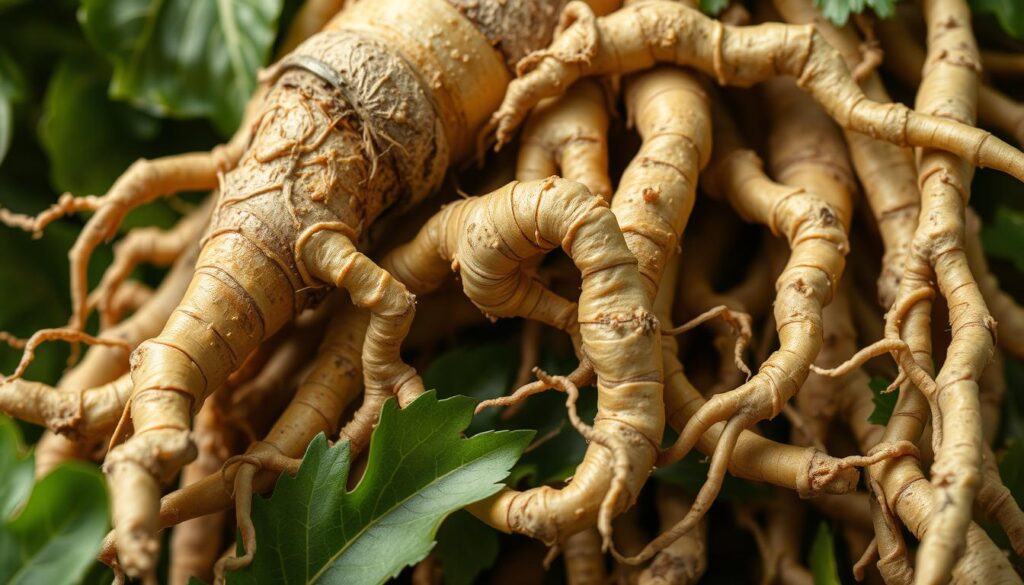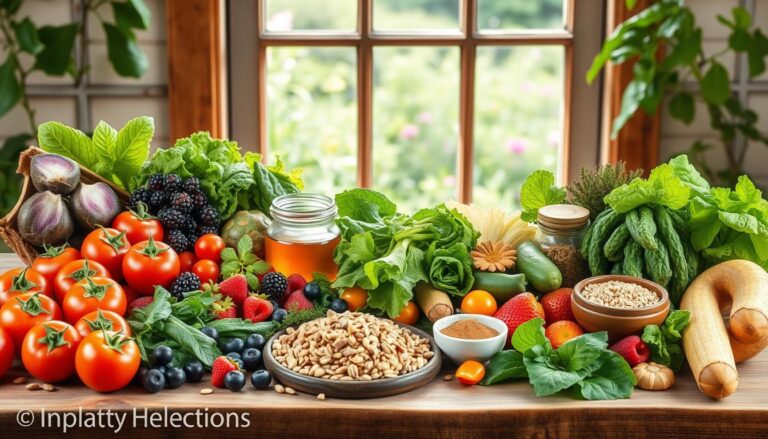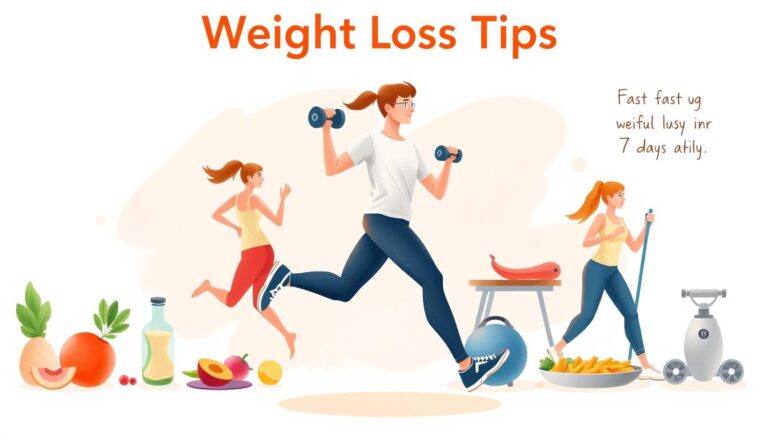In today’s fast world staying focused is hard. But nature might have the answer. Certain herbs could boost your brain power energy and sharpness. And they do it naturally without synthetic stuff.
We’ll look at herbs that help with focus, concentration, and brain health. Ginseng energizes, while bacopa monnieri boosts memory. We’ll cover their benefits and possible side effects. This guide will help you use herbs to improve your brain.
Key Takeaways
- Certain herbs such as ginseng, sage bacopa monnieri, and rhodiola rosea, have been shown to improve focus, concentration memory and cognitive function.
- Herbal supplements like guarana peppermint oil, and rosemary oil can provide a natural energy boost and enhance mental alertness.
- Adaptogens like ashwagandha can help the body and mind adapt to stress, supporting overall cognitive performance.
- It’s crucial to consult with a healthcare professional before using any herbal supplements due to potential side effects and interactions with medication.
- Incorporating a variety of focus enhancing herbs into your daily routine can help you achieve better mental clarity and concentration naturally.
Introduction to Herbs for Focus
In today’s fast-paced world staying focused can be hard. Sleep, diet and exercise are key for our brains. But, some herbs might help boost our mental performance and brain health too.
For centuries, plant-based supplements for mental clarity have been used in Ayurveda and Traditional Chinese Medicine. They help with focus memory and concentration. Now science is exploring their benefits.
Herbs like ginseng boost energy, and bacopa improves memory. This section will look at how herbs to improve focus and concentration can help. By learning about these herbs you can naturally support your brain health.

Traditional plant-based medicines have been used since ancient times to promote human mental well-being.
Remember while herbs are promising, they shouldn’t replace medical care. Especially if you have brain health issues. Always talk to a doctor before adding herbs to your routine.
Ginseng The Energy Boosting Herb
Ginseng is a well-known herbal supplement. It’s known for boosting energy mental alertness and cognitive function. The most studied type is Panax ginseng. It contains compounds like ginsenosides, eleutherosides, and ciwujianosides. These may help improve performance.
Types of Ginseng and Their Benefits
Research shows different types of ginseng offer various benefits:
- Panax ginseng: May improve brain function reduce physical and mental fatigue and enhance memory and reaction time.
- American ginseng: Helps the adrenal glands improving resilience against stress and fatigue.
- Korean red ginseng: Increases immune cells and boosts antioxidants in the body.
Dosage and Potential Side Effects
The usual ginseng dosage is about 200 mg daily. But it’s crucial to know ginseng can interact with some medications. It may cause side effects like insomnia, diarrhea increased heart rate and high blood pressure. Experts advise against long term use to avoid these issues.
| Ginseng Dosage Guidelines | Potential Side Effects |
|---|---|
| Daily doses of ginseng typically range from 200 milligrams of Panax ginseng extract to 0.5-2 grams of dry root. | Nervousness insomnia headaches upset stomach, and allergic reactions. |
| Capsule dosages of ginseng usually range from 100-600 milligrams a day. | Ginseng is not recommended for use by children, pregnant women or lactating mothers due to safety concerns. |
| Quality and active ingredients in ginseng supplements can vary widely between manufacturers. | Ginseng can interact with various medications including digoxin blood thinners diabetes medications and stimulants. |
Ginseng is a top herbal medicine worldwide. Its benefits for focus, energy, and cognitive function have been studied a lot. When choosing Panax American or Korean red ginseng always talk to a healthcare professional first.

Read more: Ginger A Superfood with Incredible Nutrition
Sage The Cognitive Enhancing Herb
The humble herb sage Salvia is a natural way to boost brain power. It’s full of phytochemicals that support brain health. Research shows sage’s amazing potential for cognitive enhancement.
Sage, known as Salvia is part of the Lamiaceae family. It has over 160 polyphenol compounds, like phenolic acids and flavonoids. Its leaves also contain terpenoids adding to its unique benefits.
Sage helps the brain by blocking the enzyme acetylcholinesterase AChE. AChE breaks down acetylcholine a key neurotransmitter for memory and learning. By stopping AChE sage keeps more acetylcholine in the brain improving brain activity and cognitive performance.
Studies show sage’s benefits for memory, attention, and brain function. Standardized extracts of Salvia officinalis and Salvia lavandulaefolia improve memory and cognitive skills. This is true for both healthy people and those with mild to moderate Alzheimer’s disease.
The compounds in sage like rosmarinic acid and quercetin, protect the brain. They help fight oxidative stress and amyloid-beta neurotoxicity which harm brain function.

Sage is a natural ally for cognitive enhancement. It’s proven to sharpen focus boost memory and support brain health. Adding sage to your wellness routine is a smart choice.
What Herb Helps with Concentration and Focus?
Two herbs, bacopa monnieri and rhodiola rosea, are known for boosting focus and concentration. They come from traditional medicine and are known for their brain boosting effects.
Bacopa Monnieri The Memory Boosting Herb
Bacopa monnieri is an Ayurvedic herb with compounds called bacosides. Research shows it can improve memory and learning, making it great for boosting memory and focus.
Rhodiola Rosea The Stress Relieving Herb
Rhodiola rosea is used to increase mental energy and reduce stress. Studies show it can lessen mental fatigue and improve mood and performance. It helps keep the mind sharp and focused.
Herbs like bacopa monnieri and rhodiola rosea have shown promise in supporting cognitive function and mental clarity making them natural alternatives for individuals seeking to enhance their concentration and focus.
If you’re having trouble focusing, these herbs might help. They’re good for anyone wanting to improve their mental sharpness. Adding them to your routine could boost your concentration and brain power.
Guarana The Natural Energy Booster
Looking for a natural way to boost your focus and energy? Guarana is your answer. This plant from the Amazon has been used for centuries. Its seeds have more caffeine than coffee beans with 2-8% compared to coffee’s 1-3%.
Guarana also has other stimulating compounds like theophylline and theobromine. This makes it a strong natural stimulant for concentration. Some studies suggest it can improve attention alertness and memory for a short time.
But too much guarana for focus and energy can cause problems. It might increase heart rate, cause tremors make you agitated, and raise blood pressure. Always talk to a healthcare professional before using guarana.

Guarana has been used for centuries in the Amazon region for its stimulating properties, and modern research suggests it may provide short-term cognitive benefits.
Guarana’s long term effects are still being studied. But it could be a great tool to boost your focus. Remember to use it in moderation and with a healthcare professional’s advice.
Essential Oils for Focus
Certain essential oils may help improve focus and concentration. These oils come from plants and have compounds that could boost mental alertness and brain health.
Peppermint Oil The Invigorating Aroma
Peppermint oil is a mix of spearmint and water mint. It’s been studied for its ability to wake up the senses and sharpen focus. A 2013 study showed peppermint oil can prevent fatigue and improve exercise performance. This suggests it could increase energy and alertness when inhaled.
Rosemary Oil The Cognitive Enhancing Scent
Rosemary oil may also enhance cognitive performance memory and protect against brain diseases. A 2016 study found that mixing spearmint and rosemary essential oils improved learning, memory and brain health markers. Another 2012 study revealed rosemary oil boosts mood, brain waves and the autonomic nervous system.
Read more: Rosemary’s Anti-Inflammatory Benefits
Remember, the quality and purity of essential oils can differ. Always talk to a healthcare professional before using them. Also essential oils should be used with caution especially around pregnant women breastfeeding mothers, those with asthma, children, or pets.

Research supports the use of essential oils like peppermint sweet orange spearmint rosemary and lemon to decrease fatigue and increase focus.
Ashwagandha The Adaptogenic Herb
Ashwagandha is an ancient Ayurvedic herb that’s getting more attention. It’s known for helping with focus and concentration. This herb has compounds called withanolides which might fight inflammation and protect against damage.
Research is showing that ashwagandha can boost how well we do on mental tasks. It might also help us pay attention better and react faster. This makes it a great natural way to improve mental clarity and focus.
Benefits and Potential Side Effects
Studies say ashwagandha can lower stress and fatigue. These feelings can make it hard to focus. In a study in India 130 people taking ashwagandha felt less stressed and slept better.
They also had better memory and focus. A study in the US with 60 students found similar benefits. They felt more energized mentally clear and slept well.
Even though ashwagandha is usually safe, some people might get mild side effects. These can include diarrhea stomach pain and vomiting. Always talk to a doctor before taking it especially if you’re on other medications.
It’s important to pick high quality ashwagandha supplements. Look for ones that have been tested by trusted organizations. This ensures the product is safe and works well.
Ashwagandha has shown promising results in improving focus, concentration, and cognitive function, making it a valuable addition to one’s natural healthcare routine.
Conclusion
Using natural herbs for focus and concentration and plant based supplements for cognitive enhancement can help your brain. Herbs like ginseng, sage, bacopa monnieri, and ashwagandha have shown to improve brain function. They are known for their cognitive-enhancing properties.
Adding these herbal remedies to boost mental clarity to a healthy lifestyle can make a big difference. This includes regular exercise, good sleep, and eating well. But always talk to a doctor before starting any new supplements to make sure they’re safe and work well.
The trend of using natural herbs for focus and concentration is growing. It’s key to use these remedies wisely and as part of a healthy lifestyle. With the right approach these plant based supplements for cognitive enhancement can naturally support your brain health. This can lead to better productivity and overall well-being.





